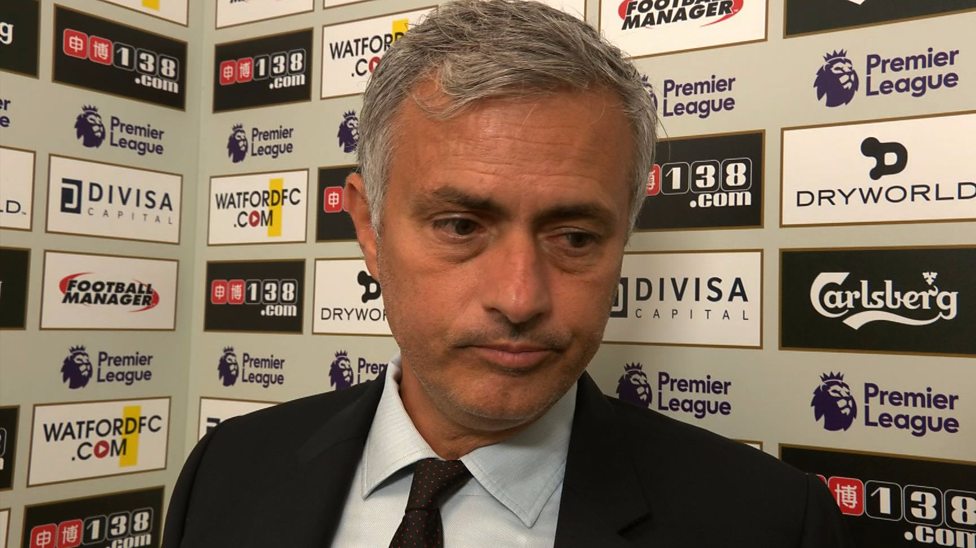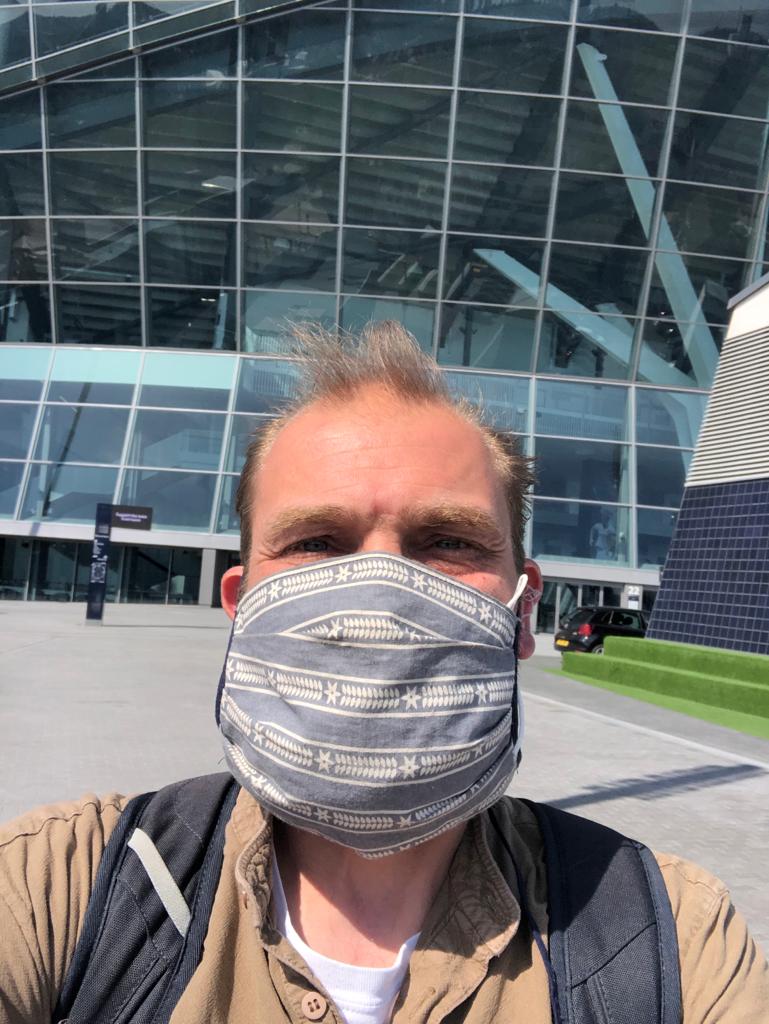Mourinho's anti-Spurs safety-first ‘style' turned fans against him
Jose Mourinho's sacking was as predictable as the football his Tottenham side served up, says the New Journal's Spurs correspondent Dan Carrier
Monday, 19th April 2021 — By Dan Carrier

Jose Mourinho was sacked by Spurs after less than 18 months in charge
THE departure of Jose Mourinho, with six Premier League games left to go and the small matter of the Carabao Cup final on Sunday, has long felt a matter of when, not if – and his sacking this morning (Monday) brings to an all too predictable end a sorry 18 months at Tottenham Hotspur.
From the off, Daniel Levy’s decision to call for Mourinho felt like the actions of a gambler going all in on the turn of the next card.
Despite Mourinho’s insistence he was offering “The Special One Mark II”, and that he had learned lessons after his spell at Manchester United, Levy had been amply warned by his ever popular predecessor Mauricio Pochettino that Spurs were in need of a re-build.
The momentum built during Poch’s first two seasons had been eroded by the time he was fired, the new stadium draining resources from the pitch – where it matters to the fans, a fact barely hidden by the incredible run to the Champions League final in 2019.
And now, 18 months and some £30million later, Levy has seen enough, leaving Spurs fans to enjoy the fact that they are the only club Mourinho has managed where he hasn’t won a trophy.
After Friday’s turgid 2-2 draw at Everton, only the most blinkered optimist could believe this was a journey Mourinho would be allowed to guide for much longer.
Three centre-backs and two holding midfielders against a side who had won just once since the turn of the year at home. Three points was a must, and the starting line-up spoke volumes about Mourinho’s football philosophy.
He always appeared to want to win games through a war of attrition, focussing forensically on trying to stop the opposition instead of setting his sides up to play to the squads strengths.
Over the weekend, the rumours escalated that Levy had seen enough – reports suggested it would be May when the axe fell.
Instead, the pay off cheque has been signed and now former player Ryan Mason looks likely to enjoy leading the side out in Sunday’s Carabao Cup final.
Levy promised a serial winner – a man who despite an apparently unsuccessful stint at Manchester United still won them the Europa League, the FA Cup and secured a second placed finish.
Tottenham’s perennially fragile squad, with players who need a motivator in front of them, must have wondered what was to come.
It was his way or the highway, an approach that, as Paul Pogba said last week, created bad vibes in the dressing room and built up cliques.
After Spurs tumbled out of the Europa League against Dinamo Zagreb in March – throwing away a 2-0 lead in the process – club captain Hugo Lloris was forthright in describing an unhappy squad.
Maybe, the optimists said, with no more cup competitions to distract them, and the Carabou Cup final already booked, Spurs would make a charge through the pack to grab fourth spot – but form cannot be turned on at will, and the 3-0 defeat at Zagreb felt a pivotal moment.
Mourinho also had some big boots to fill. With hindsight, Poch was the genius fans thought him to be.
It seems incredible today that he took Spurs to a Champions League final with Moussa Sissoko and Harry Winks in the middle of the park. Before his sacking, many felt Poch wasn’t the problem – players were in need of a gee-up, all made worse by the loss of Mousa Dembele.
It looked like they were worn out by that last hurrah in Amsterdam against Ajax. Poch warned he needed new players, but instead of griping, he explained patiently in press conferences he understood things were tricky while the club plonked a futuristic sports bowl on the old White Hart Lane.
When he was handed funds Poch bought Tanguy Ndombele and Giovani Lo Celso in his last transfer window – the boss hardly got to see them play due to injuries, and in Ndombele’s case a chronic lack of match fitness even when he wasn’t carrying knocks.
Few wanted him sacked, and saw the decline as a necessary blip while Poch got a new team up and running, but Levy, who has gone through 10 permanent managers in 20 years, has never been known for his patience.
Mourinho, who Levy had admired from afar for years, was sitting at home tinkering with Subbuteo. It felt like too good an opportunity.

Dan Carrier watching Spurs during the pandemic
Clearly, with the Covid pandemic turning life on its head, Mourinho was operating under a new set of circumstances. But it can’t be forgotten it was a level playing field. Every other club faced the same situation.
Fingers cannot be pointed at any lack of support, either – last summer Spurs fans were boasting they had won the transfer window with the arrivals of Pierre-Emile Hojbjerg, Joe Rodon, Matt Doherty, Sergio Reguilon, Carlos Vinicius and Joe Hart, with the cherry on the cake being the return of Gareth Bale.
Considering the state of the world economy, and the huge losses endured due to Covid, there could be no grounds for complaint.
Should Levy have known better? Did he miss a trick by not backing Poch to start again, or finding a manager with a freshness about him – think Thomas Tuchel – to help make the new home a new fortress?
It’s not like there isn’t previous. Appointing a legend from a London rival with a reputation for winning things in a manner which would have Danny Blanchflower tossing lightning bolts down from the heavens has happened before – and ended in exactly the same way.
Spurs danced with the devil when they appointed George Graham 20 years ago. Having been fired by Arsenal, he kicked his heels doing DIY – he used his down time to lay a patio marked out with an Arsenal motif at his Hampstead home.
The theory was Graham would sort out a historically leaky defence, add missing steel, and be desperate to get one over his former employees.
Fans were sceptical then, too – the closest display to any sort of appreciation was a round of ironic “Man In A Rain Coat’s Blue and White Army.”
Mourinho scowled along the touchline in front of only a few full houses, due to Covid – but it takes leap of imagination to think any fan would have raised their voices in appreciation had they been there.
There were early rumours on social media that Mourinho was unhappy with Tottenham’s controversial decision to join the so-called European Super League – but such timing feels just all-too-convenient.
There will be few fans mourning the decision to sack Mourinho. No supporter can be sorry to see the back of the performances of the past 18 months: despite the brief false dawn of the autumn, when Spurs took advantage of the lacklustre start by Manchester’s City and United, Chelsea and Liverpool.
By December, normal service had resumed: Mourinho’s team retreated in to themselves, his famous ability to organise defensively was put to the test as Spurs conceded cheap goal after cheap goal.
No other side has dropped so many points from winning positions. No other side has performed so badly against other top half teams.
Above all, managers are paid to manage. The job can’t be about splashing vast sums on already established superstars. They are there to create a team, to make everyone on that training pitch feel important, perform to their best and then push themselves further.
Poch knew this. Speaking in an early press conference, Poch described his job as infusing a sense of togetherness before anything else – the antipathy of how things panned out since the Argentine’s sacking in November, 2019.
There are plenty of examples: Dele Alli had been off the boil for a while, but so had his teammates.
Instead of finding a way of rejuvenating a player who had at one point been the hottest young midfield prospect in the country, Alli has disappeared and now looks like he’d rather be back at MK Dons than being stuck to a bench while Mourinho ignores him.
Another case of Mourinho’s approach is illustrated by Matt Doherty. Under a year ago, he was seen as the answer to Tottenham’s right-back problems, and worth the £12m spent. Six months later he wasn’t getting into match day squads, suggesting that the duty of care the manager has towards those unsettled or out of sorts was missing.
If a player is struggling, the manager’s job is to work out why and do what they can to fix the issue – not freeze the player out and make things worse.
And then there is Gareth Bale. He had shown what he could do once given a run of games, but his little purple patch this spring hit the buffers in a terrible team performance against Arsenal. It was to be the last start the Welshman was handed.
Mourinho’s inability to integrate the club legend turned fans against him, and seemed symptomatic of the anti-Spurs safety-first ‘style’ he was trying to foster.
What next, then? Crucially, Levy has to sell the idea of a new boss to those who are good enough to be playing at the highest level. Is there a name out there, with a big enough and clear enough vision, to keep Harry Kane and Heung-Min Son happy?
Levy surely believes so: he has looked at his hand and twisted again.
The tragedy is his last gamble hasn’t ended because the dealer unexpectedly passed him a poor hand.
Instead, the appointment of Jose Mourinho always looked like a stacked deck, and todays news was as sadly predictable as the football Mourinho’s Tottenham side served up.